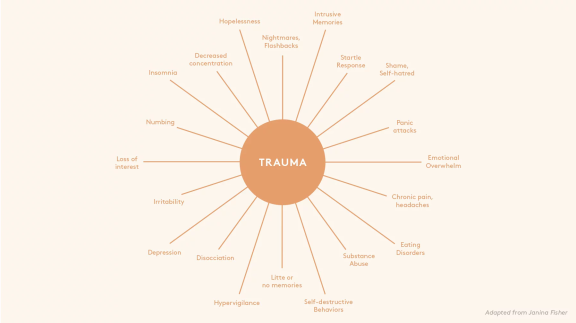“Making the choice to embark on therapeutic work is different for everyone,” explains clinical social worker and therapist Tanisha Christie, LCSW. Many of her clients come to her because a shift has occurred — a crisis such as a death or job loss, or a recurring problem with a loved one. It could also be because they’re not sleeping well or continually feeling sad. As many of us navigate feelings of anxiousness and uncertainty — in some cases for the first time — we asked Christie, who works in two private practices in New York, for tips on how to manage grief, as she’s helped so many others orient themselves around a path forward.
My Black clients have been experiencing and living their lives through state-sanctioned violence for generations. So while there are new awakenings for people of Whiteness, there is intergenerational grief/trauma that people are and have been managing. Dealing with the effects of racism, or coming to the realization that one has benefitted from a culture of white supremacy, is what I’ve encountered during this time.
There is also a pervasive feeling of guilt of not doing enough to make the world a better place. Diving deeper into one’s guilt and shame around what is happening in our society is hard, but that is The Work of confronting our shortcomings, healing from those who might have harmed us and seeing our vulnerability as a strength. Coupled with the global pandemic, grief and loss is coming up often — whether it's the death of a loved one or the life that they have loved. This is a period of great change — can be perceived as loss.
Grieving is not a monolith process and shows up differently in everyone. Some people’s process seems to be very internal, not expressive; others’ grief might seem unwieldy. Many want to rush grief but that is connected to not wanting to feel ‘bad” or the ‘negative’ feelings on the emotional spectrum that comes with it.
Our culture in the United States promotes work and productivity over resting, this is one way most people are coping with their grief. Many people rather focus on their careers than their feelings, or simply want to “get over” their sadness so that they can be better at their jobs as a way to avoid pain. (You’d be surprised how many people come to therapy wanting to be more productive.) Overworking appears to be a ‘good’ excuse due to the economic instability the pandemic has caused. Those who are suffering will come to their grief when they are ready. There is no one way or right way to grieve.
Liberation-based healing is a methodology that takes a decolonial approach to therapy. It’s a term from Dr. Rhea Almedia, founder of the Institute of Family for Family Services in New Jersey. I have done anti-racism and oppression training in the past. Since my foundation is in social work, I tend to look at people in context to their environment. Our society, including our institutions, are based on hegemonic ideologies that affect how we view our world, how we live in the world — not just for people of color, but for people of Whiteness as well.
Most of my work with clients is centered around assisting people to identify what they are feeling and normalizing their lived experiences. I take a strengths-based approach because it’s important for people to understand their own resilience.

Trauma is an emotional response to a terrible event like an accident, rape, or natural disaster, as defined by the American Psychological Association. No one experiences a traumatic event or is affected in the same way. Often for people with complex or compounding trauma, they have symptoms instead of memories. I often share Dr. Janina Fisher’s graphic to show how trauma might be impacting them.
Most people might not recognize these symptoms as trauma. As the chart above suggests, trauma might show up as body aches, lack of sleep, headaches; or nightmares, flashes of images in the mind that do not make logical sense. Certain sounds, smells, even colors can trigger an emotional response. These expressions of the trauma live in the part of the brain that is responsible for emotional memory, the amygdala, which plays a role in memory formation. These symptoms “take over” and can become unmanageable. At that point, people usually begin to feel like they are “going crazy” or it might become hard to function in a way that feels ‘normal’ to them. Once identified, I find that many clients begin to understand how they work and see themselves with more compassion.
I am not an integrative medicine mental health professional at this time so I don’t prescribe supplements, but I do believe in a holistic and integrative approach to wellness. I encourage clients to see their doctor (ask them a lot of questions) and get routine check-ups if they are able, as vitamin deficiencies, other illnesses and diseases can have symptomatology that resembles mental health concerns.
Many people have self-care practices that include herbal remedies, such as CBD based on information that they have discussed with friends and researched for themselves via the internet. CBD does come up often for those who are managing symptoms of anxiety — including difficulty sleeping. There was a trial published in 2019 that looked at CBD for anxiety and sleep which detailed that over a period of three months there was a rapid decrease in symptoms. There are also studies for the use of CBD for people who have PTSD, and addiction as well. While many natural remedies, like CBD and herbs have little to no negative side effects, everyone’s individual psychobiology is different. A dosage that might work for one person, might not work for another, so I encourage clients to seek out integrative medical mental health care specialists or nutritionists who can support the use of CBD as part of their wellness practices.
An integrated approach to wellness takes time, so I suggest for my clients to keep track via an app or journal. I admit it can be tedious but worth it if one can stick to it for a few weeks.
Loneliness, solitude, being alone, isolation are all different states. (I do feel these states of being can be considered differently from a power perspective if one chooses. ) However, that feeling of loneliness might create a sense of overwhelm, which I hear often; Flight or fight responses get triggered in the brain and usually maladaptive behaviors like overeating or drinking too much alcohol might happen as a way to quell the feelings. At times, it might even feel like being isolated and alone is a personal failure, which might make one feel ashamed or depressed.
Being isolated alone is different than being a single mother isolated with young children. There are also essential workers who are on the front lines of the pandemic that have to make the difficult choice of either moving away from or sending family members away. Or worse, unable to isolate due to their living situations. Sometimes our minds do run away from us. This time is unprecedented and everyone’s situation is different.
A few suggestions I’ve been making is to limit news intake to manage one’s anxiety; be as social as possible, while social media platforms have its faults, it can be a way to keep connected with those far away. Get to know your neighbors. Join a mutual aid initiative where you live. People underestimate the power of helping others as a way to help themselves. Plan your day by creating and maintaining some sort of schedule. Even if it’s as simple as making your bed, getting breakfast, and going for a walk.
Photo of Tanisha Christie by JD Urban.
